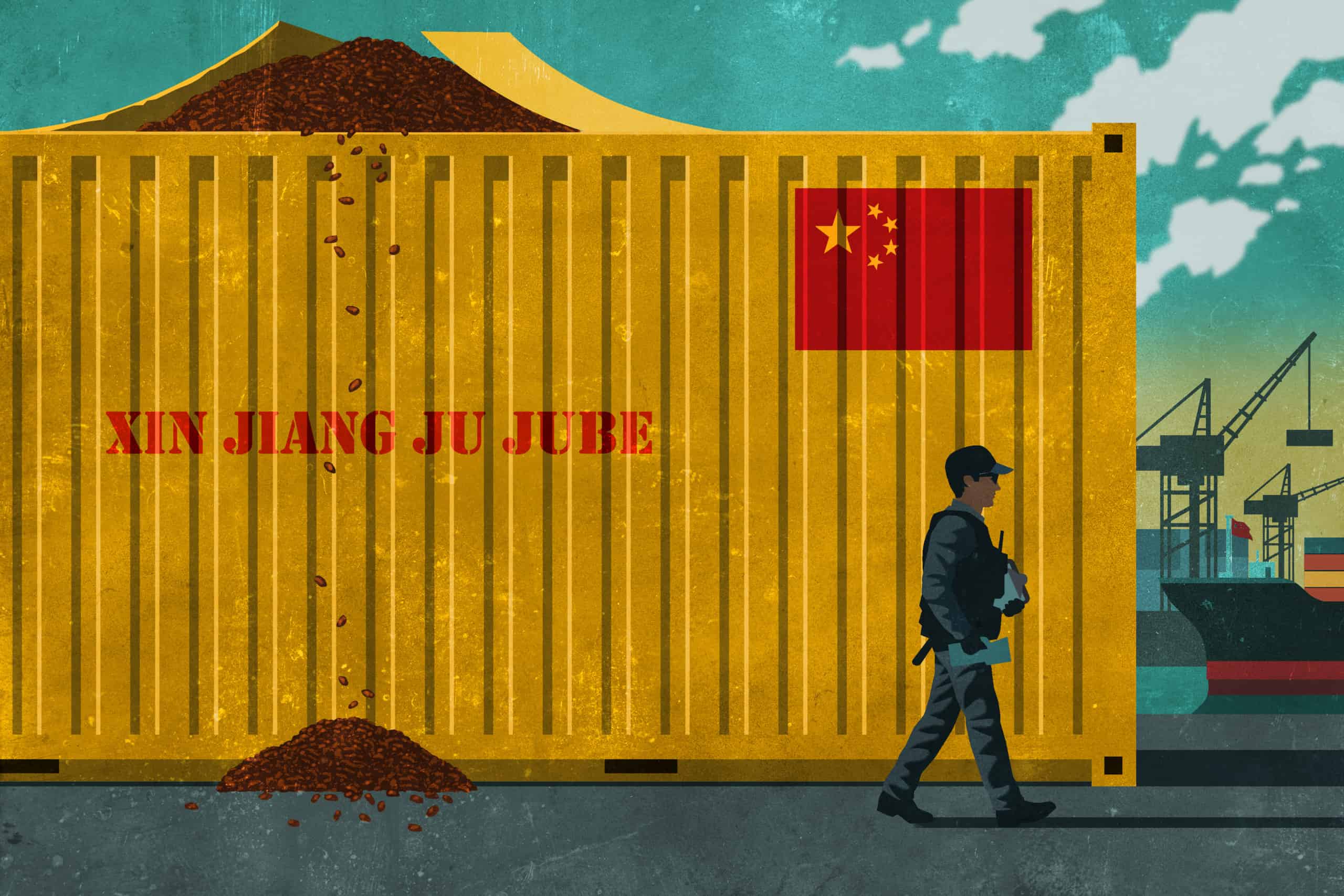
One weekend in March, a casual shopper in an Asian supermarket in Falls Church, Virginia, came across a surprising discovery in the fruit aisle.
Innocuously labeled “SWEET DATES” in English, it was the Chinese that caught her eye: 兵团红红枣 — “Bingtuan Red red dates.”
Bingtuan is another name for the Xinjiang Production and Construction Corps (XPCC): the Chinese state-run paramilitary conglomerate with sprawling powers in government, prison management, media, and education, as well as agricultural and industrial production. Its operations are key to what the U.S. government has labeled a genocide against Uyghur Muslims in China’s Xinjiang region and the company’s leaders have been sanctioned by a phalanx of Western countries.

So why are the Bingtuan’s dates being sold less than half an hour from the White House?
It turns out that red dates — small fruits also known as jujubes — are the third largest agricultural product by volume from Xinjiang, behind cotton and tomatoes — both of which have already been strongly linked to forced labor. Agriculture is a mainstay of Xinjiang’s economy, and the region is known for its red dates, making “Xinjiang red dates” akin to “Georgia peaches” or “Florida oranges” in terms of signifying quality to Chinese consumers.1In December, angry nationalist netizens, egged on by state media, called for a boycott of Walmart and Sam’s Club stores in China after the retailers purportedly stopped stocking fruit from Xinjiang, including red dates.
But outside of China, any association with Xinjiang, and especially the XPCC, now hurts more than helps. The U.S. recently blacklisted the XPCC by placing it on the Uyghur Forced Labor Prevention Act’s (UFLPA) Entity List. The new U.S. law, which went into effect in late June, is intended to block American imports from Xinjiang unless suppliers can prove that they were made without forced labor.
Curious if this new law would prevent the sale of Xinjiang’s famous red dates in the U.S., The Wire went to several Asian supermarkets in July to see if they were still being brazenly marketed. They were.
In fact, a new report by the Uyghur Human Rights Project, a Washington D.C.-based research and advocacy group, has identified more than 70 different brands of Xinjiang-grown or processed red dates in supermarkets in the Washington, D.C. metropolitan area as well as the online stores of Walmart and Amazon.
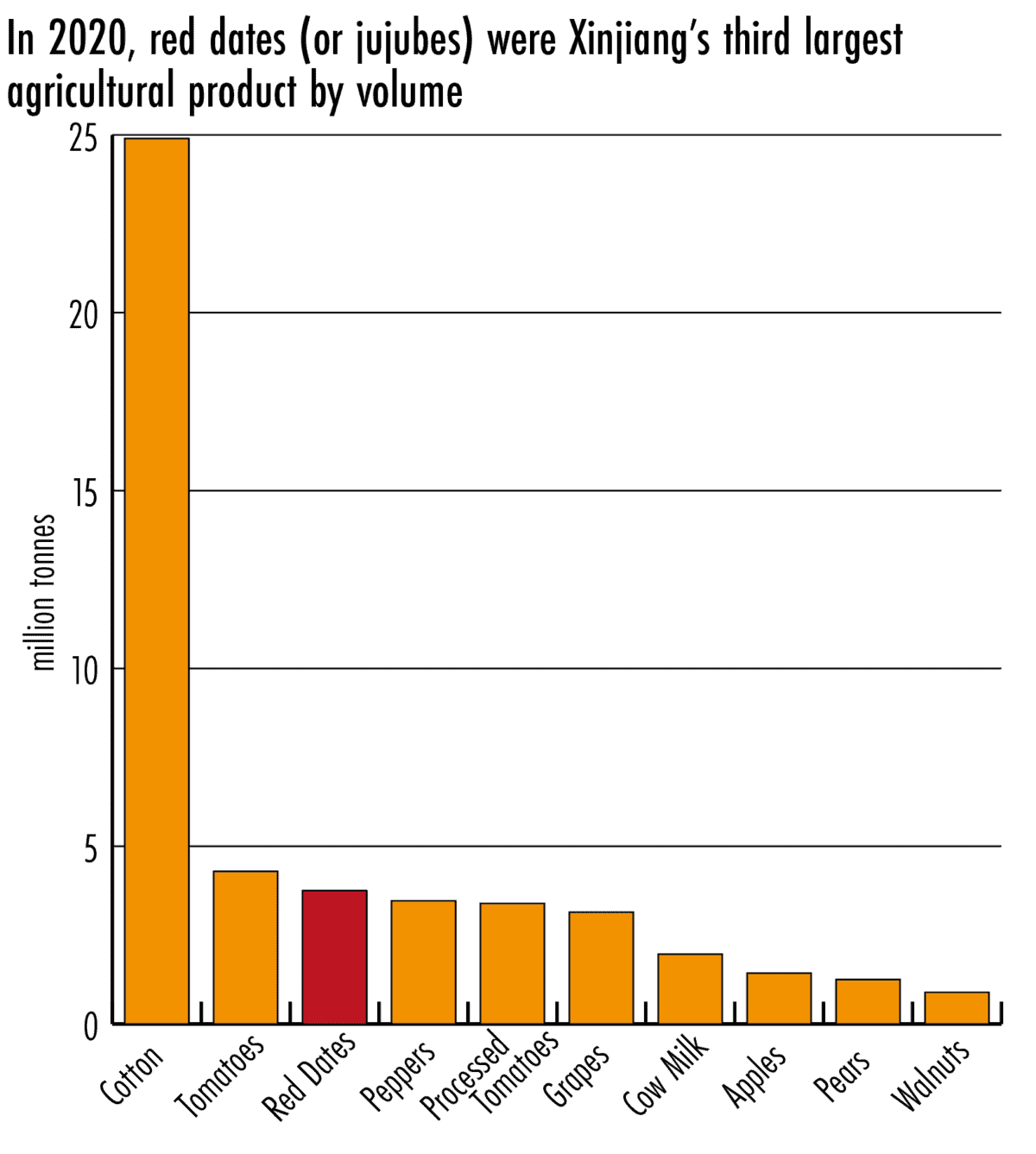
Red dates are not a staple of most American diets but the sweet, earthy fruit is common in Chinese recipes: submerged in a pot of tea or baked into a dessert at your local dim sum spot. And for the XPCC, they represent big business. An outsized portion of Xinjiang’s red dates are grown on XPCC farms. While the group controls roughly a quarter of the region’s arable land, it grows more than half of its dates. The XPCC also holds a majority stake in at least 13 red date producing companies, which make up more than 25 percent of China’s red date production. Overall fruit production by the group was valued at nearly $4.4 billion in 2018, with red dates comprising nearly half of its fruit output.2According to the XPCC Statistical Yearbook. See pages 182 and 204
Of course, it is difficult to know for sure whether Xinjiang-sourced red dates are produced with forced labor. The XPCC and the Chinese Communist Party maintain strict control over information in Xinjiang, and several independent supply chain auditors have been forced out of the region, making oversight all but impossible.
But a large and growing body of evidence shows that XPCC is involved in the mass incarceration of Uyghur Muslims and forced labor, including operating prisons located in, or adjacent to, agricultural and manufacturing facilities. Researchers have linked these facilities to a wide range of raw material outputs, including chemicals, coal, textiles and food.
It is illegal for any U.S. person to have financial transactions with the XPCC. And yet, importers are transacting in their products.
Louisa Greve, director of global advocacy at the Uyghur Human Rights Project
Red dates are also often farmed on the same land as cotton. They were the primary fruit “intercropped” with cotton in 2018, according to XPCC data, and mounting evidence, including first-hand testimony from Uyghur ex-detainees, has alleged the widespread use of forced labor in Xinjiang’s cotton fields. As a result, U.S. Customs and Border Protection (CBP) issued a wholesale ban on Xinjiang cotton importation into the U.S. in January 2021.
Compared to Chinese cotton textile imports into the U.S., a multi-billion industry, the value of Chinese red date imports looks tiny: $3.2 million in 2021.3The value of annual U.S. imports of Chinese tomato products is closer in value to dates. But unlike cotton and tomatoes, which are often mixed with other products and repackaged — making sourcing efforts close to impossible — Xinjiang’s red dates are reaching American stores largely unchanged. They are the literal low-hanging fruit when it comes to understanding — and potentially disrupting — Xinjiang supply chains.
“The bottom line is, there are products on American store shelves showing the name of a sanctioned Chinese paramilitary group involved in forced labor,” says Louisa Greve, director of global advocacy at the Uyghur Human Rights Project. “This is an entity not only facing import restrictions under the UFLPA, but that is sanctioned under the Global Magnitsky Act. It is illegal for any U.S. person to have financial transactions with the XPCC. And yet, importers are transacting in their products.”
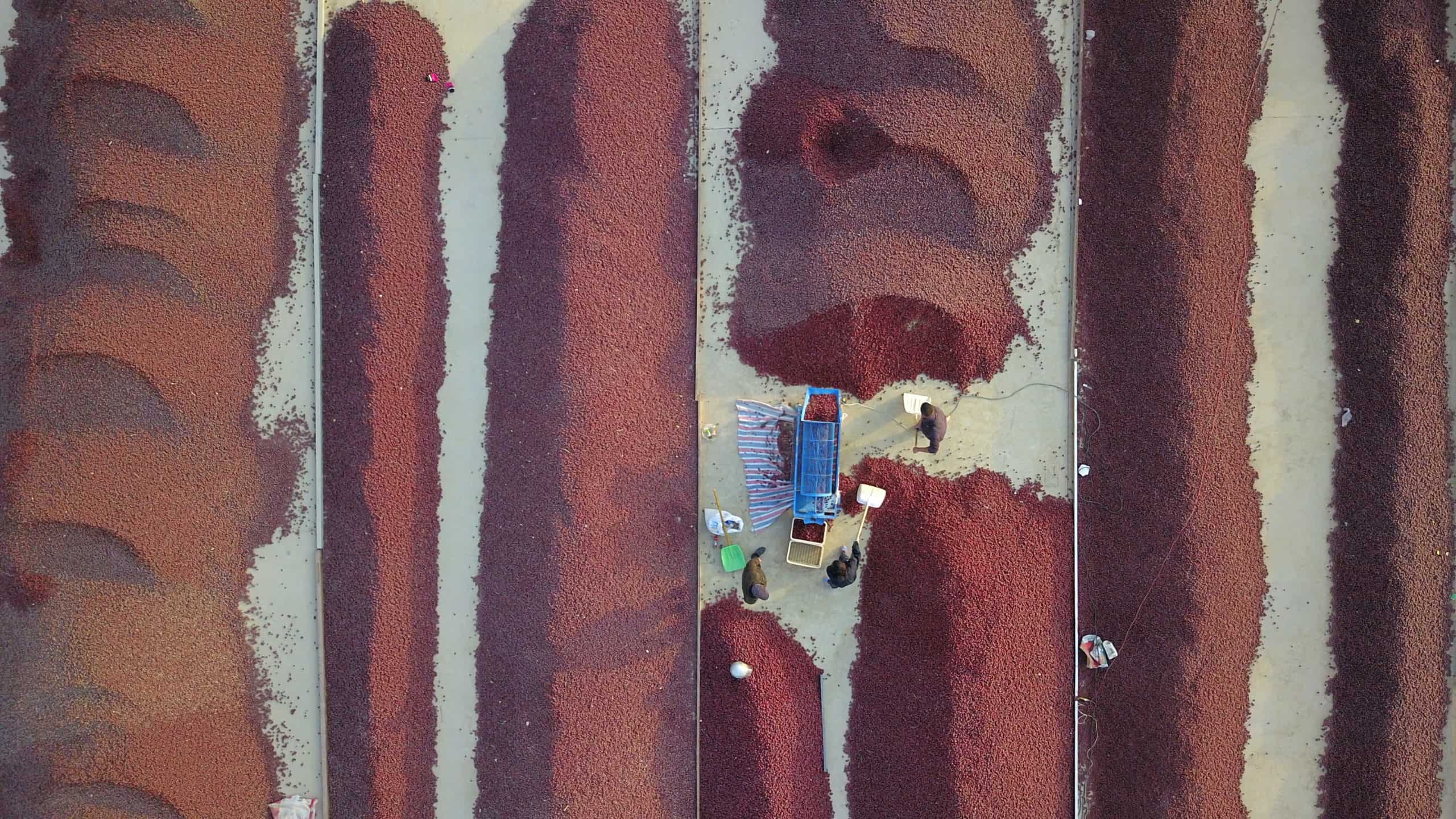
“It’s hard for me to imagine how this could not be regarded as sufficient to be actionable by Customs and Border Protection under the UFLPA,” says John Foote, a partner and head of the customs practice at Kelley Drye & Warren, a Washington D.C. law firm.
A spokesperson for CBP declined to comment for this story.
To better understand how Xinjiang red dates are getting through U.S. ports, The Wire traced one brand of red dates from its producer (a subsidiary of the XPCC in Xinjiang) to its manufacturer (a Chinese company in the city of Qingdao) to its distributor (a small company in Brooklyn) to supermarkets in Washington, D.C. and Boston. The complex journey is revealing, not only for the methods by which the brand evades scrutiny but also because it underscores the immense challenges faced by companies and border enforcement agents who are charged with preventing the flow of imports from Xinjiang.
From the consumer’s point of view, there’s an issue of authenticity, where knowing the dates are from Xinjiang is almost part of the selling point, and so producers have to advertise it as such. But they also have to hide it because they don’t want to have it seized by customs.
Darren Byler, a professor at Canada’s Simon Fraser University
“There are any number of products that are coming into the United States… that have as their origin the Uyghur region,” says Laura Murphy, a professor of human rights and contemporary slavery at Sheffield Hallam University, who has studied the XPCC. “In this case, these packages literally have Xinjiang written on them. But we’ve seen many different ways that companies in China have obscured Xinjiang inputs, making the job of companies tracing their supply chains more difficult.”
Indeed, understanding how the XPCC’s wares end up in U.S. stores requires working backwards — beginning, in the case of the Bingtuan red dates, with the discount rack on aisle one.
DISGUISED DATES

On the corner of Herald and Washington Streets in Boston, just south of Chinatown, is a squat beige building that houses C-mart, an Asian supermarket. The store is part of a chain whose parent company, Great Wall Supermarket, includes 18 stores from Massachusetts to California. During one visit to Boston’s C-mart in late July, The Wire found close to a dozen different brands of red dates, almost all advertised as originating in Xinjiang.
“There’s an interesting kind of cross purpose happening here,” says Darren Byler, a professor at Canada’s Simon Fraser University who specializes in Xinjiang research. “From the consumer’s point of view, there’s an issue of authenticity, where knowing the dates are from Xinjiang is almost part of the selling point, and so producers have to advertise it as such. But they also have to hide it because they don’t want to have it seized by customs.”
Great Wall Supermarket did not respond to requests for comment.
U.S. Customs requires fairly basic information about the provenance of imported goods. On a commercial invoice, a shipper will likely be required to disclose the country of origin and the manufacturer and shipper, along with their addresses but not much more. On brand packaging, the Food and Drug Administration (FDA) requires even less information about a product’s journey: typically just the country of origin and the name and address of the distributor — the party responsible for delivering shipments from a warehouse to the supermarket.
As a rule, “the food industry is very secretive,” says Sylvain Charlebois, a professor of food distribution and policy at Dalhousie University in Canada. “It’s a high volume, low margin business, so people are very careful with the information they have.”
The half a dozen words on the back of a package are all most consumers have to go on, but The Wire supplemented these breadcrumbs with publicly available shipping data as well as corporate records to recreate the contours of a map.
In C-mart, on the bottom shelf of the discount aisle, The Wire was drawn to red dates of the brand Gather Red (聚天红) for two reasons: their size — individual dates almost as large as chickens’ eggs — and their packaging, which listed the name of a parent company: Xinjiang Alar Gather Red Industry Co.
Data in WireScreen, The Wire’s sister site, shows that Xinjiang Alar Gather Red’s largest shareholder is the State-Owned Assets Supervision and Administration Commission of the XPCC First Division.
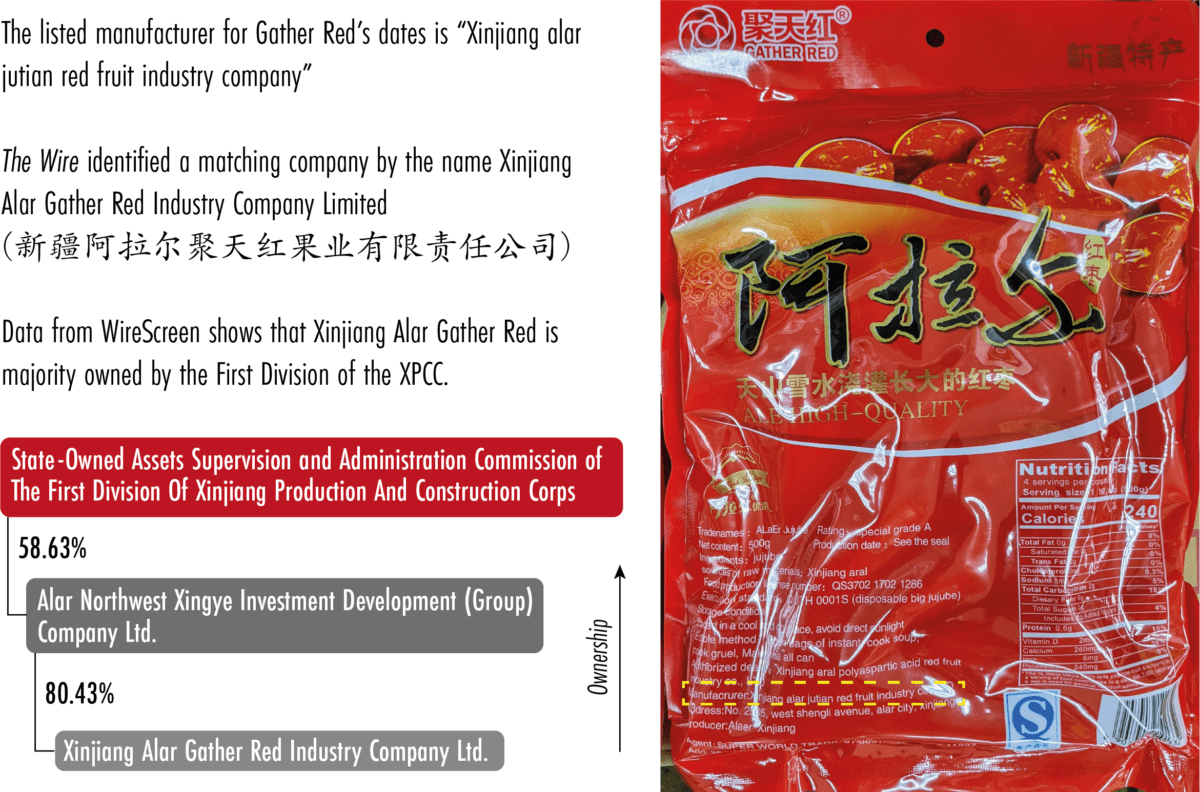
Credit: The Wire
Fruit production is a particularly big business for the First Division, one of 14 XPCC military divisions that operate like county-level governments in different regions. In 2018, output by the First Division made up 44 percent of the XPCC’s total fruit production.4See page 182 5Another major brand of red dates, bingtuan hong (“Bingtuan Red”), which was mentioned at the start of this story, is owned by a company controlled by the XPCC Third Division. A new report released by Sheffield Hallam University links the First Division to prison labor programs in industries such as coal mining, textiles, containers and pig products.6See pages 17-18.
Packaging information also lists Gather Red’s distributor-cum-importer as Super World Trading, a New York-registered trading company and one of a constellation of Brooklyn-based Asian food wholesale distributors responsible for stocking specialty supermarkets along the east coast. U.S. corporate registration records show that Super World Trading has held the U.S. trademark to the Gather Red and ‘Alar’ logos since 2015.
Many of these companies pop up as traders, but they really do nothing. Some may never even take possession of the goods — they’re handling a transaction for other parties.
Ana Hinojosa, a former top official at CBP
Super World Trading did not respond to requests for comment.
Using WireScreen, The Wire discovered that Gather Red is an XPCC product, even though such information isn’t disclosed on customs forms. Goods from Xinjiang are rarely imported directly to the U.S.: a mere 0.1 percent of U.S. imports from China in 2020 came directly from the region. Understanding how the dates made it from Xinjiang to Brooklyn requires more information — namely, a middle man. And it is at this stage, somewhere between the farm in Xinjiang and an American port, that the obfuscation happens.
Method 1: The Do-Nothing Shipper
| Arrival Date | Consignee | Shipper | Port of Unlading | Port of Lading | Weight (kg) | HS Code | Goods Shipped |
|---|---|---|---|---|---|---|---|
| Jun 6, 2022 | Super World Trading Inc. Ridgewood, NY 11385, USA | Taishan Wuhu Food Manufacter Taishan, Jiangmen, Guangdong, China | New York/Newark Area, Newark, New Jersey | Nansha, China | 16,110 | 1701.9 | DRIED RED JUJUBES |
| May 26, 2021 | Super World Trading Inc. Ridgewood, NY 11385, USA | Taishan Wuhu Food Manufacter Taishan, Jiangmen, Guangdong, China | New York/Newark Area, Newark, New Jersey | Yantian, China | 17,040 | 4407.91 | DRIED RED JUJUBES(500G 24) DRIED RED JUJUBES( 4 2. 5KG) |
| Oct 9, 2020 | Super World Trading Inc. Ridgewood, NY 11385, USA | Taishan Wuhu Food Manufacter Taishan, Jiangmen, Guangdong, China | New York/Newark Area, Newark, New Jersey | Yantian, China | 16,070 | 0511.99 | DRIED RED JUJUBES(500G 24) DRIED RED JUJUBES( 4 2. 5KG) |
| May 2, 2020 | Super World Trading Inc. Ridgewood, NY 11385, USA | Taishan Wuhu Food Manufacter Taishan, Jiangmen, Guangdong, China | New York/Newark Area, Newark, New Jersey | Yantian, China | 15,440 | 0813.4 | DRIED RED JUJUBE(500G 24) DRIED RED JUJUBE(4 2. 5KG) NO WOOD PACKIN G MATERIALS |
Shipping records from Panjiva, a trade data provider, show that Super World Trading imported containers of red dates from a Chinese shipper named Taishan Wuhu Food Processing Company, which is registered to the city of Taishan, in southern China’s Guangdong Province. But company ownership records from WireScreen show no discernible link between the shipper and Xinjiang or the XPCC. More confounding still, while the most recent shipment of dates purportedly sent by Taishan Wuhu arrived in the U.S. in June of this year, records show Taishan Wuhu closed more than a year ago.
Taishan Wuhu could not be reached for comment.
When customs investigators monitor imports for red flags, identifying the the importer or the distributor is crucial. But the use of small-scale trading companies like Taishan Wuhu (the Chinese shipper) poses a challenge, experts say, because their role in the supply chain can obfuscate the true producer or manufacturer of the goods in question.
“Many of these companies pop up as traders, but they really do nothing,” says Ana Hinojosa, a former top official at CBP who helped to establish the agency’s forced labor division. “Some may never even take possession of the goods — they’re handling a transaction for other parties.”
At this point, the trail from Xinjiang to Taishan Wuhu Food Processing Company would have run cold had The Wire not stumbled upon a lucky detail: a Chinese food production license number on the back of the packaging — a detail not generally required under FDA labeling rules.
Searching that production license number yielded a Chinese e-commerce site advertising Gather Red dates under the same production number and, crucially, the name of a manufacturer: Qingdao Gather Red Fruit Industry Co. (青岛聚天红果业有限公司)
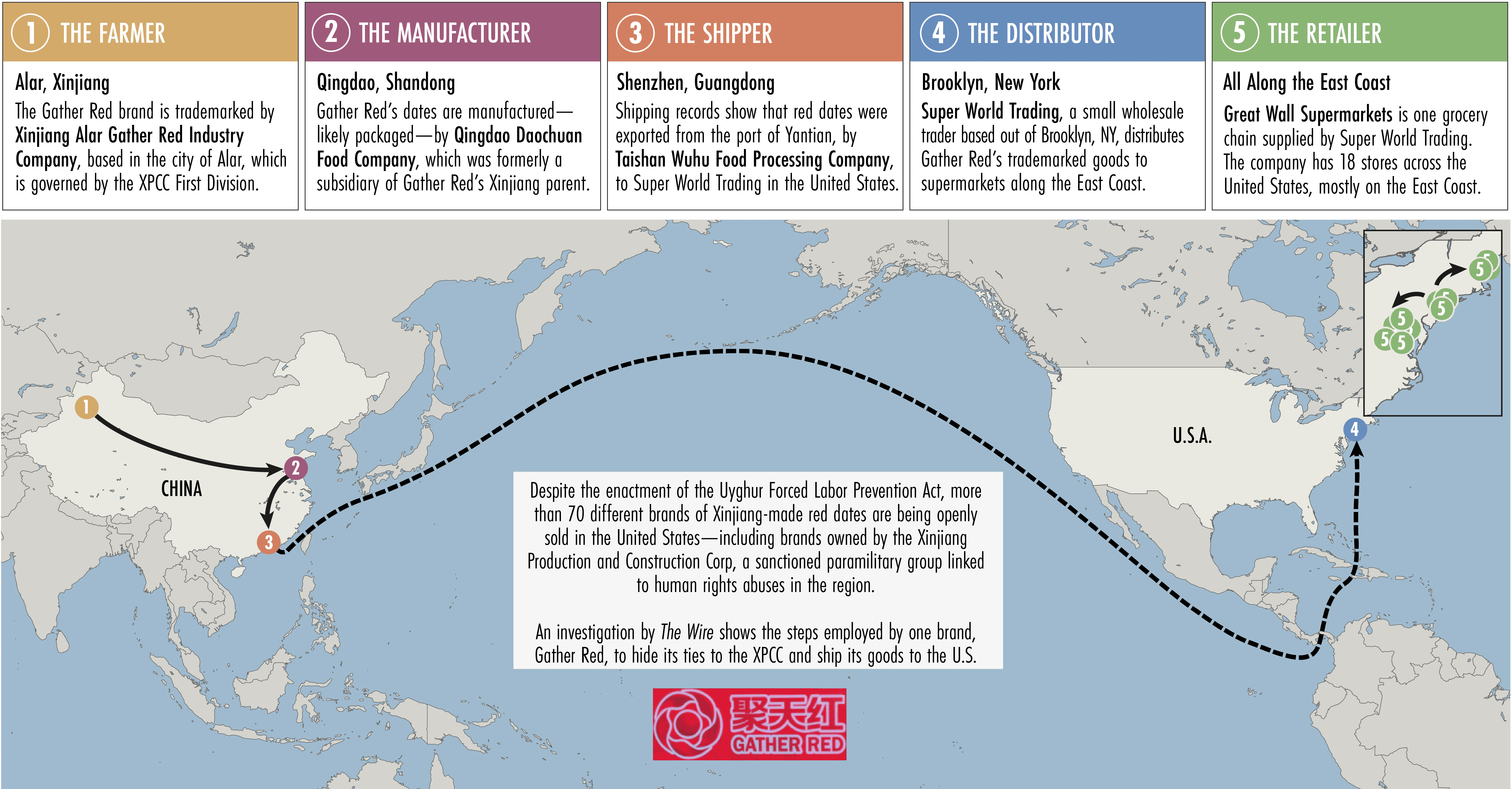
Design by Hiram Henriquez
Method 2: The Out-of-Province Subsidiary
Theoretically, if you’re an agent at U.S. Customs and trying to stop the import of goods from Xinjiang, looking at the location of the manufacturer is a good place to start. But Gather Red’s manufacturer is a company based in Qingdao, a northern coastal city some 2,000 miles east of Xinjiang.
Experts say it is common for Xinjiang-based companies to have subsidiaries located outside its home province. Data collected by the Center for Advanced Defense Studies (C4ADS), a Washington, D.C. nonprofit, estimates that the XPCC controls close to 3,000 subsidiaries, including large numbers of firms registered in other regions of China.
“Companies headquartered in the Uyghur region could have any number of reasons to open new subsidiaries in other provinces,” says Murphy, at Sheffield Hallam University. “Many of them do it to create an international export hub that would give them access to new markets, which means more Xinjiang-made goods in our supply chains. We also suspect that others have been starting new subsidiaries recently to create a shield between Xinjiang production bases and their export operations, protecting themselves from scrutiny of the labor conditions under which the products are made.”
A deeper understanding of Gather Red’s corporate relationships shows how the XPCC-controlled firm sought to hide its ties to subsidiaries such as its Qingdao manufacturing facility, moves that could make it harder for auditors and investigators to link the company to its Xinjiang parent.
Method 3: Shareholder Transfer and Renaming
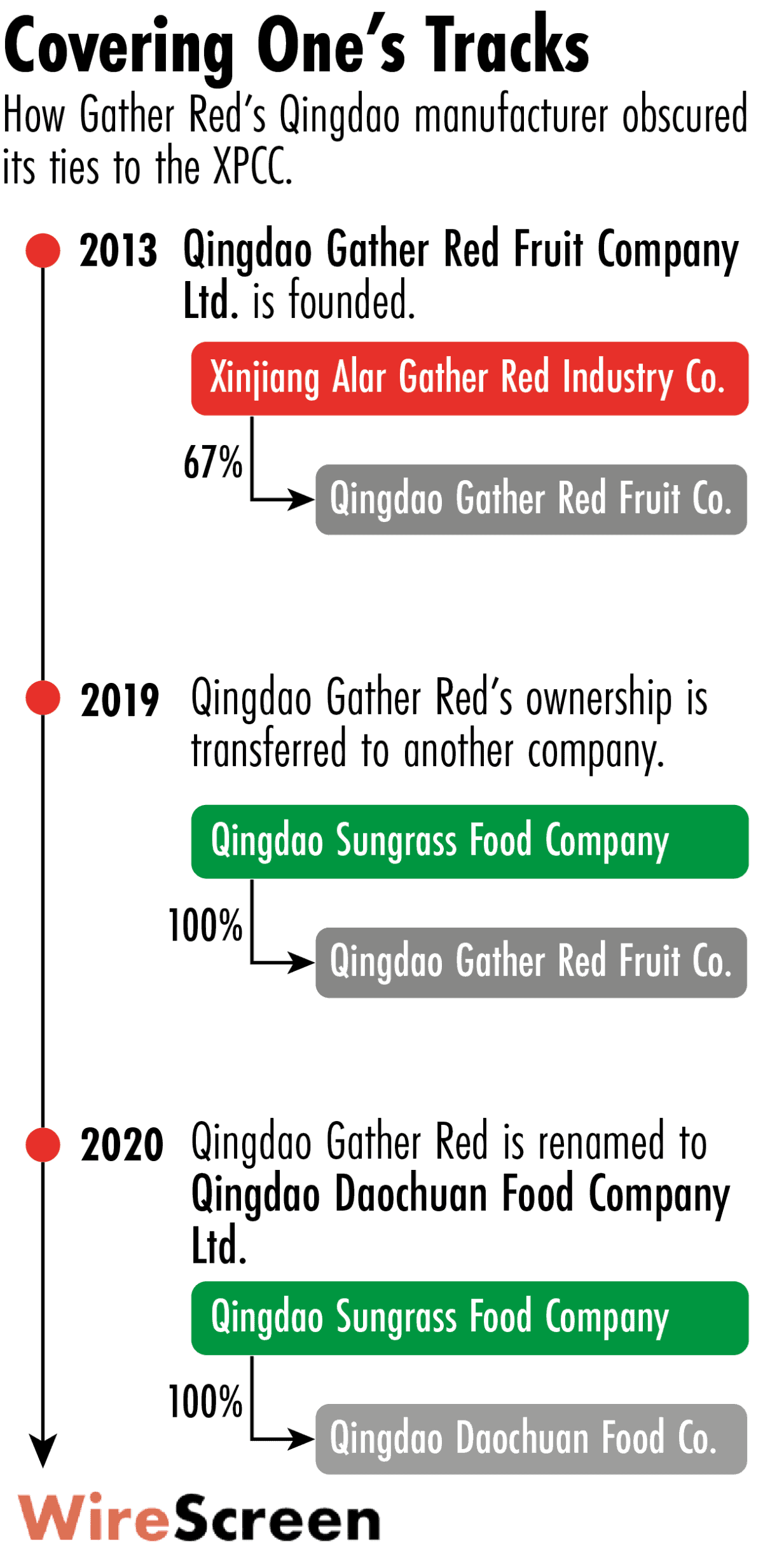
Company ownership records from WireScreen show that Qingdao Gather Red was founded in 2013 as a subsidiary of Xinjiang Alar Gather Red Industry Co. But in 2019, the Xinjiang parent company’s stake in Qingdao Gather Red was transferred to another company, Qingdao Sungrass Food Co., a seemingly unrelated food manufacturer involved principally in the export of Korean junk food. Less than a year later, Qingdao Gather Red was renamed to Qingdao Daochuan Food Company, eliminating from its official title any reference to the “Gather Red” brand.
But a few lingering clues reveal the continued ties between the new parent company and XPCC. The largest shareholder of Qingdao Sungrass is a co-investor with the XPCC First Division SASAC in an animal husbandry firm in Xinjiang. The Sungrass website, which can no longer be viewed outside of China, also mentions the company’s cooperation with the XPCC First Division in producing peppers, another large Xinjiang agricultural export.7See page 17. And a recent Qingdao Daochuan online job posting, updated last month, lists Xinjiang red dates as one of the company’s products.
Qingdao Daochuan and its parent company could not be reached for comment.
Out-of-province subsidiaries, ownership divestments, renamed companies and opaque shippers: experts say these tactics are par for the course for Xinjiang-linked companies looking to obfuscate their supply chains. Given these basic facts, it isn’t terribly surprising that Gather Red’s dates were allowed to reach U.S. supermarket store shelves. There are no obvious red flags. Records seen by The Wire show that shipments of red dates have continued to enter the U.S. as recently as July, even after the Uyghur Forced Labor Prevent Act went into effect.
WALKING THE UFLPA WALK
For nearly a hundred years, importing goods made with forced labor has technically been illegal in the United States. But for 85 of those years, the U.S. exempted goods made from slave labor if American domestic production could not meet demand. Only in 2016 did Congress close that legal loophole, known as the “consumptive demand clause,” effectively banning imports made with forced labor.
As a result, the forced labor division at U.S. Customs and Border Protection is a relatively new team. And with last December’s passage of the Uyghur Forced Labor Prevention Act (UFLPA), it’s currently facing a very big challenge.
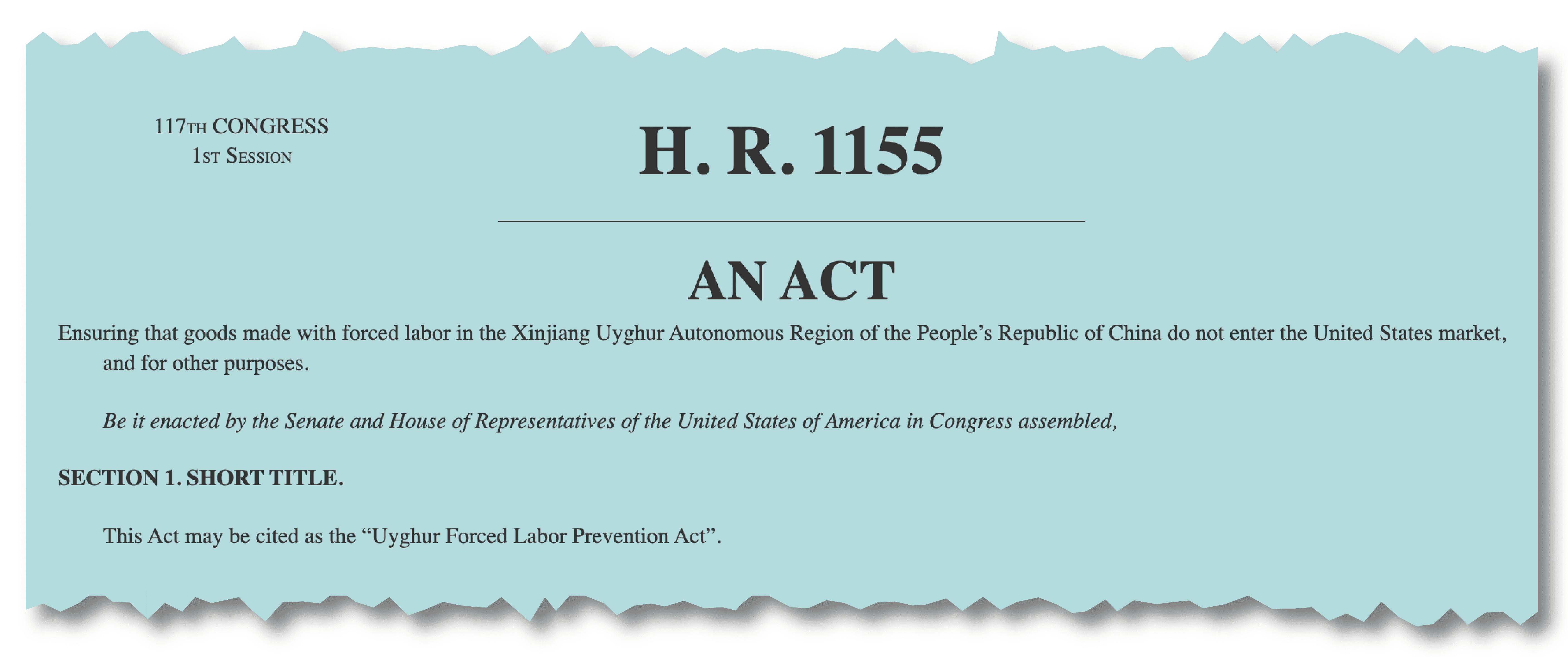
The centerpiece of the landmark bill is a “rebuttable assumption” that stipulates that “any goods, wares, articles, and merchandise mined, produced, or manufactured wholly or in part” in Xinjiang should be considered made with forced labor, unless proven otherwise. Put another way, the UFLPA empowers CBP to seize and block the entry of any goods made in Xinjiang unless importers can prove through rigorous tracing and auditing that their goods are certifiably forced labor free.
Although the law puts much of the onus on businesses, the U.S. authorities also face a tall order in enforcing it. The biggest challenge is the inherent difficulty of identifying whether a shipment has come from Xinjiang. The superior quality of Xinjiang red dates notwithstanding, X-ray scanners, sniffer dogs and, presumably, the average CBP employee can’t spot the difference between Gather Red’s dates and those grown 2,000 miles away in Qingdao, where Gather Red says its manufacturer is based.
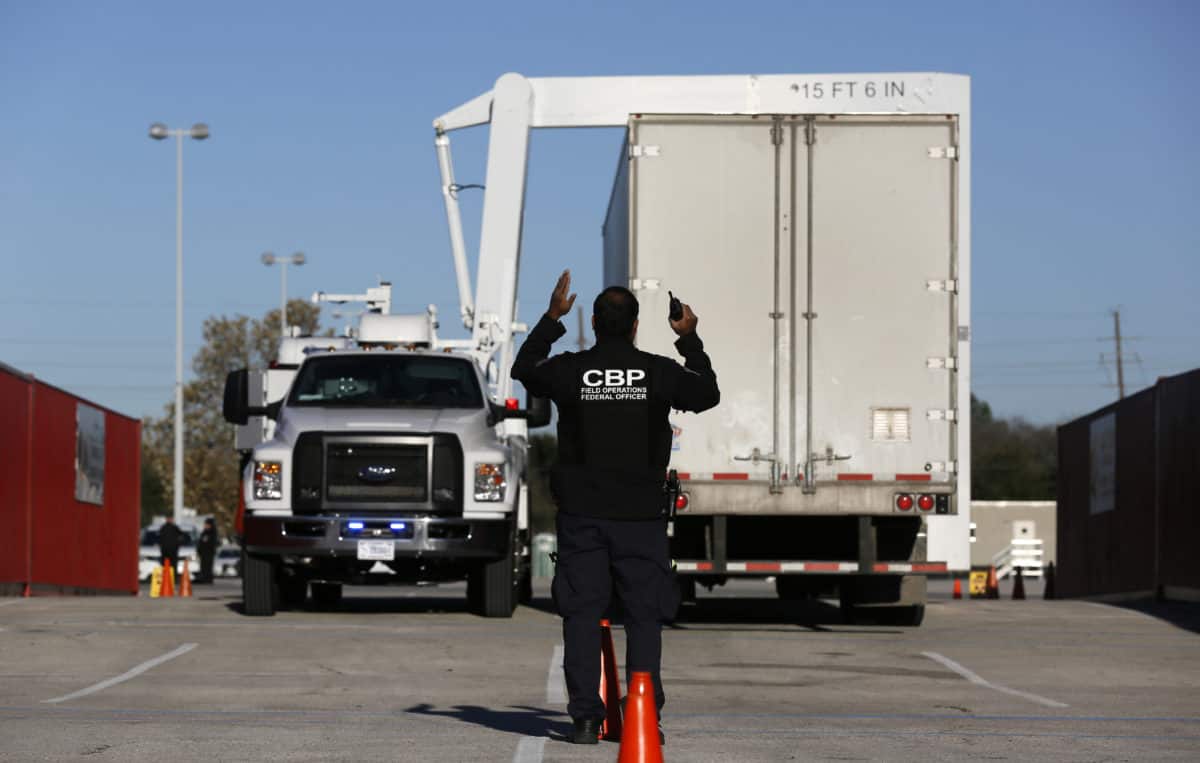
Credit: CBP photo by Glenn Fawcett
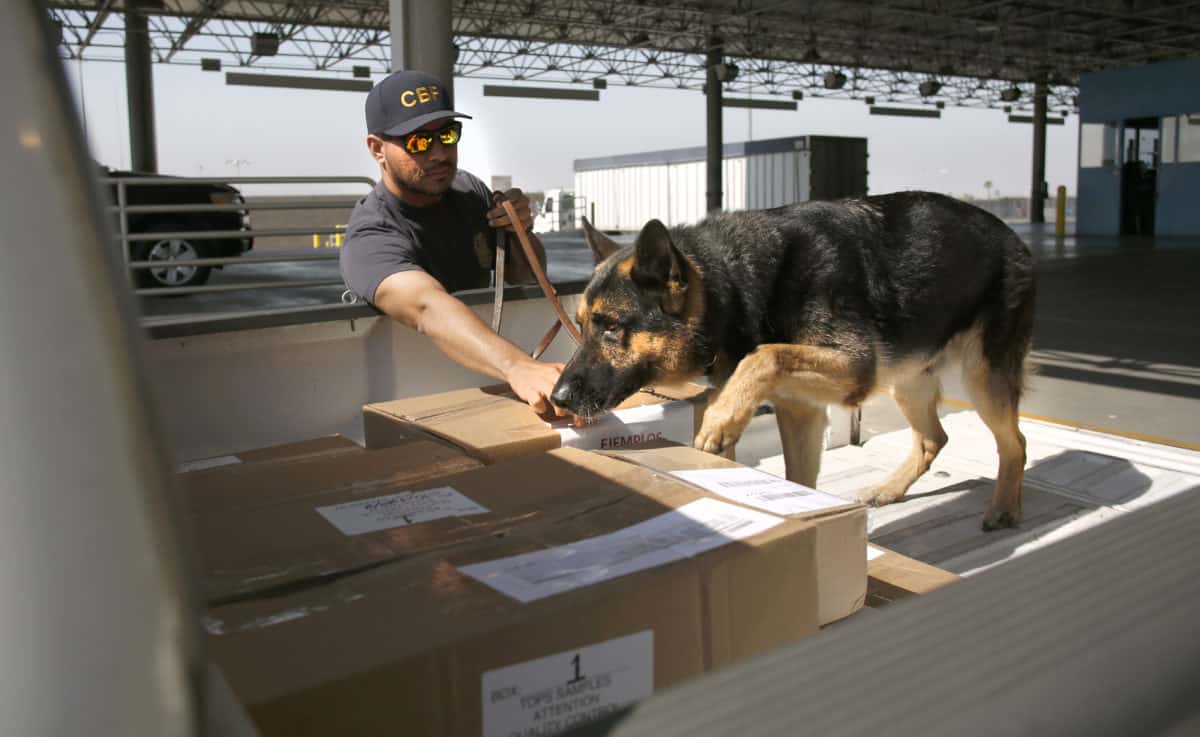
Credit: CBP photo by Glenn Fawcett
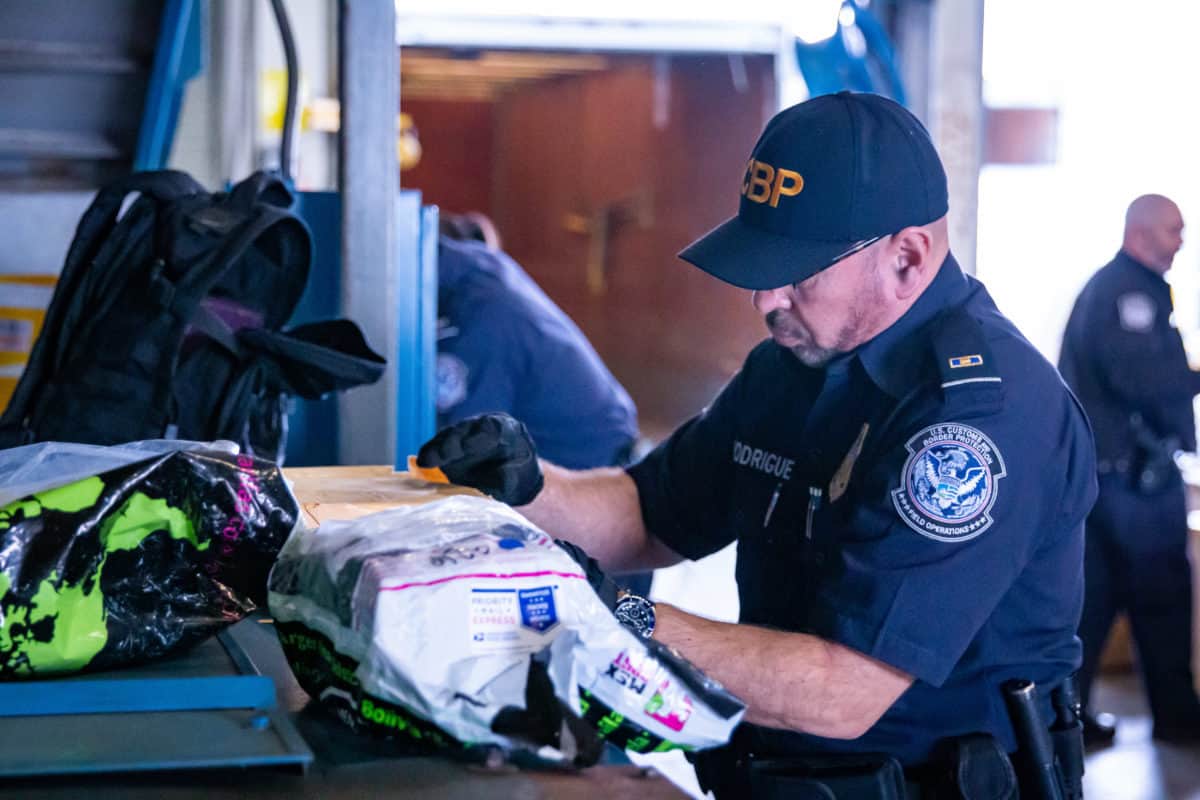
Credit: CBP photo by Ozzy Trevino
“I would say that it’s obvious that CBP is highly under-resourced to enforce this law,” says UHRP’s Greve. “There’s the matter of enforcement capacity, but also the language barrier. You can get away with a lot if international agencies are relying on [Chinese] exporters and importers to put things into the Latin alphabet so they can read it.”
Even if CBP does detain a suspicious shipment, Hinojosa, the ex-CBP official, says that is “just the beginning of enforcement.”
“That’s the easy part,” she says. “The hard part is adjudicating any requests for admissibility that you then have to have [a CBP employee] review. And somebody could submit literally thousands of documents. So you have one shipment detained and a thousand documents to review for every shipment. It’s a lot of exchange and engagement with that importer.”
This year, Congress set aside close to $30 million to help fill 65 new positions at CBP, but officials estimate that in order to fully implement the new law, the agency would need close to $100 million and 300 more dedicated staff, including import specialists, technicians, trade analysts, auditors, paralegals and attorneys.8See page 37 9The President’s budget request for the 2023 fiscal year includes a request for an additional $70 million and 150 full time employees to implement the UFLPA. See page 2.
To really dig deep into the supply chain of suspicious products, however, CBP would need more than just manpower; investigators need better tools.

Although CBP doesn’t say which software providers it uses, a growing array of vendors from the private sector have stepped forward hoping to help enforcers and suppliers alike. WireScreen, for instance, The Wire’s sister data company, offers a service that immediately mapped Xinjiang Gather Red and Qingdao Daochuan’s connections to XPCC First Division. Companies like Kharon, which provides data and analytics for compliance teams, and Altana, which applies artificial intelligence to supply chains, also claim to be able to help draw links and connections that wouldn’t otherwise be disclosed on a declaration form.
Neither responded to requests for comment about their work with the public sector.
“There’s a lot of companies out there using artificial intelligence and algorithms to make linkages, so that they can identify higher risks a lot quicker,” says Hinojosa. “The government is using all the technology they can get their hands on.”
Nevertheless, CBP is faced with more incoming shipments than it’s able to intercept, and it’s forced to take cues from third parties about which products to target first. Researchers and NGOs, for instance, have played an outsized role in helping CBP establish its enforcement priorities. Researchers such as Sheffield Hallam University’s Murphy and C4ADS, among others, have identified and highlighted specific companies with operations in Xinjiang that are particularly liable to be engaged in forced labor. And the drafters of the UFLPA in Congress explicitly instructed the authorities to draw up an enforcement plan for three products: cotton, tomatoes and polysilicon — all of which have received particular attention from the media and activists who were early in uncovering evidence of forced labor in Xinjiang.
But not everyone agrees with this method of setting priorities. Some observers think that inconsistency in the law’s enforcement will affect the willingness of companies to comply. If importers believe that the CBP is only going after a select few high priority sectors, that could give firms in other sectors a license to continue to look the other way.
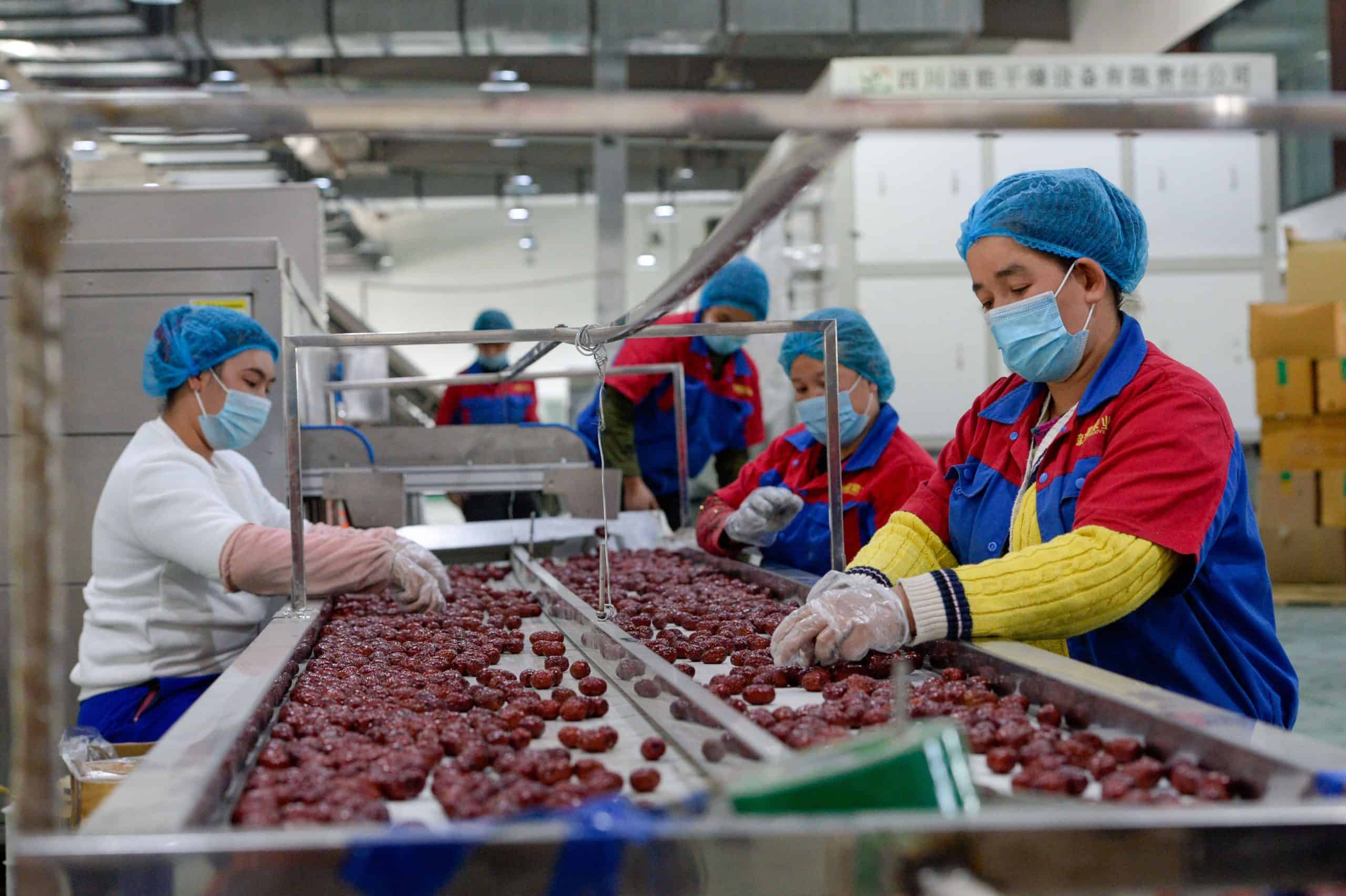
Enforcement that is dictated by political winds “is a real problem in my view,” says Foote, the lawyer. “Is CBP, either knowingly or unknowingly, allowing the importation of red dates from Xinjiang because there’s a political focus on different products for enforcement? If the UFLPA is a trade law, it needs to be equitably, fairly and comprehensively enforced like a trade law, with clear standards and objectives governing the enforcement process.”
Some observers say CBP could do a lot more to establish those clear standards. When the agency detains shipments, for instance, it shares little information to importers about why. This makes remediation difficult, and it also keeps companies largely in the dark about which suppliers and subsidiaries are trustworthy and which should be avoided. While CBP publishes a UFLPA “Entity List” of companies to avoid, that list is short.
“There’s a certain level of evidence that’s required to put a company on that list, and it sounds like more will be added in short order, but CBP does not always indicate which company is the company of concern,” says Virginia Newman, a lawyer with Miller and Chevalier, a Washington D.C. law firm that advises companies on how to comply with the UFLPA. “Their targeting strategy is clearly encompassing more companies than are included on the UFLPA list.”
It’s just the beginning of enforcement. I think that CBP is having to crawl before they walk on how they deal with some of their responses.
Ana Hinojosa, a former top official at CBP
Hinojosa, the ex-CBP executive, defends the government’s decision to keep the list of blacklisted companies vague.
“The reality of what the government has seen is, the minute an entity is named, they change their name and start operating under a new one because the old name is going to be flagged and they know it,” she says. “So within a week, those names have changed and are of no use to the private sector.”
Two months into the enactment of the UFLPA, it remains to be seen to what extent such shortcomings of enforcement are growing pains, and to what extent they are inherent problems with the legislation.
Identifying the Xinjiang products to crack down on “is a relentless drum beat,” says UHRP’s Greve. “It’s also raisins, it’s walnuts. We found so many Xinjiang products on grocery store shelves that we had to narrow it down to red dates, but they’re just the tip of the iceberg. What else is out there?”
Hinojosa notes that “CBP is having to crawl before they walk on how they deal with some of their responses.”
As they learn to walk the UFLPA walk, however, the CBP needs every bit of help it can get understanding and identifying the XPCC’s tactics in Xinjiang. Hinojosa points to a website that CBP has set up where individuals can report allegations of shipments linked to forced labor.
This summer, an anonymous filer left a tip about Chinese red dates.

Eliot Chen is a Toronto-based staff writer at The Wire. Previously, he was a researcher at the Center for Strategic and International Studies’ Human Rights Initiative and MacroPolo. @eliotcxchen



